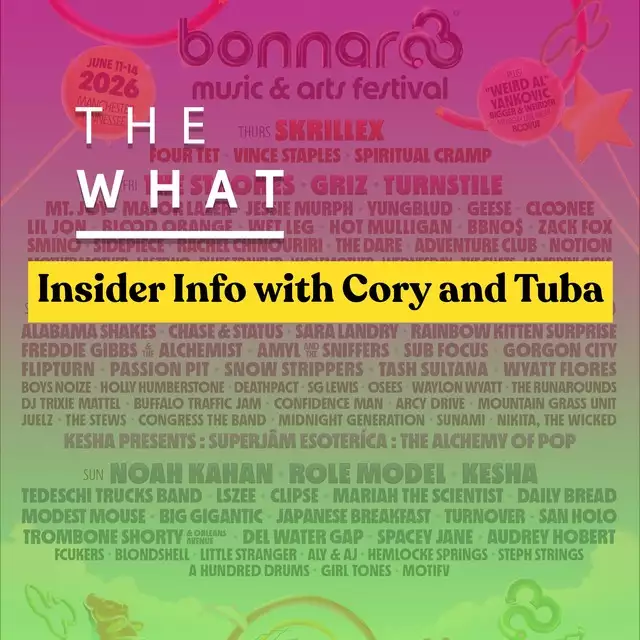
In this High Five Clip, Brad and Barry from The What Podcast speak with Ali Hedrick and John Bongiorno of Arrival Artists.
The insiders give our hosts some insight into what goes into being a booking agent for bands. They reveal their process of how they try to develop artists from being able to fill a 200-seat club to headlining Bonnaroo.
Listen to what happens on today's High Five Clip, and then check out the full original episode here. Then, remember to like, review, and subscribe to The What wherever you get your podcasts.
| 00:00 | Intro |
| 01:59 | Interview with Ali and John |
| 11:45 | Outro |
It's a what podcast?
High five.
Brad, Barry Courter, Lord Taco.
Lord Taco, very festive today.
Look at that.
Thank you.
Thank you.
You are, you're like a young Santa.
You even look like Santa.
I'm getting there.
Alcoholic Santa.
Yeah.
Yeah.
Today's high five.
Very exciting when you look around, especially right now when you're talking rumor season
and how bands get booked and how they get from one stage and then progress to the next.
Today's high five sort of addresses that Barry Courter.
Yes, absolutely.
We talked to Ali and John from Arrival Artists.
They work with C3.
If you remember, we go back, this was not long after we talked about force majeure, the
legal term that we'd never heard of.
This was during the pandemic.
And so we were all kind of curious how we were going to come out of it.
And we thought, you know, let's just go find out people who actually do this for a living
instead of talking to, you know, idiots like us.
And they did a terrific job of setting us straight, me especially, because I'd spent
years talking about, like I knew what I was talking about, about how they booked, you
know, within a certain radius.
And Ali was pretty quick to set me straight.
And I loved it.
What I loved about Ali coming on the show was she sent us an email before.
She goes, yeah, I've been listening to the podcast, although you guys get some things
right.
You get some things wrong.
Let me come on the show and tell you everything you need to know.
Thank God she did, because it was a masterclass on how some of this works.
So today's high five, Ali and John from C3, rival artists.
Let's do it.
What do you say?
I'm in.
Let's go.
All right.
Let's go.
All right.
So let me let's start from let's start from the from the seed and the ground.
You have a band like Mount Joy.
Let's just use Mount Joy as an example, because we have mutual friends there.
So Mount Joy wants to go on tour.
How do they find you and why do they find you?
And for how long do you work for them?
Well, we're we're one of the only people in the industry that doesn't have a contract.
So bands can leave us at any time that they want.
But generally speaking, we all kind of tend to sign artists that have teams in place.
So a manager that I already work with will approach me about a new act or record label
that I do a lot of business with will say, hey, we just signed this new act or we'll
find it on our own and are we'll find an act through a Spotify playlist or from a mutual
friend will listen to will like it and then we'll start to spread it out throughout the
industry and we'll send it around to labels and managers that we like and try to create
teams of people that way.
You know, not very often to to something completely unattached to do any of us end up working
with.
I got you.
And so when Mount Joy calls you and you say, OK, is the first question that you ask them
is what's your budget?
No, never.
OK, so what are you asking of them?
What are you needing from them?
What is your goal for a band like Mount Joy?
Who you know, you could probably the talent.
I just need to listen to it and hear the music and think the songs are catchy and think
other people are going to like it.
And then whenever I'm going to sign an act to, I think, can I see this band one day selling
three thousand tickets in every major market?
That's kind of I like to look at it that way.
I mean, I didn't used to earlier on my career.
Certainly it was never thinking that way.
Early, early days you would think like, well, you're from Chicago.
Can you sell 200 tickets in Minneapolis and in Milwaukee, in Madison, Wisconsin and in
Indianapolis?
And if you can, then it's time for you to get a booking agent.
But nowadays, you know, that's kind of that's long gone.
People are getting booking agents from signing one act.
Is it that you guys know your territories?
I mean, do you think about an act with what you just said?
I know Minneapolis, I know Nashville, I know whatever your routes.
Do you think these will work here?
Are there multiple routes that you think that might work?
Generally speaking, when we try to when we sign an artist, we're trying to sign them
for the whole world aside from Europe.
So we'll work in Australia.
We'll work in South America.
We'll work in Asia, Canada, all those places.
And every band is different.
I mean, for a band that is coming from Australia, who is on a major label, you're thinking about
them because, you know, by default, a band coming from another country is already a worldwide
band.
So you're thinking about them here in terms of Seattle and Portland and San Francisco
and Los Angeles and Denver and Chicago and Minneapolis and Toronto and New York and Boston
and D.C. and the big, big cities, you know, like where the MLB teams play.
But with a local jam band who is not international, anything but international, who has inconsistent
but tangible pockets of fans everywhere, you look at those bands in more terms of like
New York City and Albany and Buffalo and Rochester and State College, Pennsylvania and Philadelphia
and Pittsburgh and D.C. and Grand Rapids and Detroit, you know, and you can book them more.
Although yes, so they're generally speaking, those bands who are more reliant on creating
revenue on the road play more shows a year because of it and you have to kind of get
really granular with where you play them.
And that's where that tacticalness of the routing comes in, where if you're playing
Chicago, you don't want to play Milwaukee on the airport.
You play Chicago in the middle of September, you wait to go on sale in Milwaukee until
after that show plays.
That's in the middle of December.
You don't play Indianapolis and Bloomington, you know, at the same time, but you play them.
So there's a huge difference.
And there's a those are two extreme examples, the Australian International Band and the
local jam band.
Those are two polar opposites of approach.
And there's a whole spectrum of approach in there based on the artist, how much activity
they have going on with their streaming on the radio, how reliant they are on the road.
You know, are they a band that develops on the road?
Are they a band that doesn't develop on the road?
Do they stay home and wait for the streams to kind of artificially pump them up?
And then you just go out and they're already in a bus before they ever had to, you know,
pay their dues.
Okay, so but okay, I'll start with the larger question, then I'll try to needle it down
a little bit.
Is your version of success a certain number per night?
Is your version of success when we got into 75% capacity night?
And then even further, the next step through this is, since you've gone through all of
this for so many times, and and you've worked with every possible genre of artists and level
of genre of artists, are those paths and those positions from point A to point B to point
C across the country?
Are they already pretty much well worn?
And you can already see the tour before it's even, you know, in your mind before it's even
set up?
Yes.
Okay, or an artist like I represent Dweezil Zappa, who is my longest standing client,
I've represented since 1996.
And he plays 100 shows a year.
And it's like precision.
You know, some tours, I could just look I could book him twice a year, eight weeks at
a pop.
And some of them, he'll play New York City on one tour.
And then the next tour will come back and he'll play Morristown, New Jersey and Englewood,
New Jersey, which break Ali's 100 mile rule.
And Prairie Town, New York, where I where I am now.
And then you know, and then 18 muscle pass and then he'll play New York again.
And then the next time after that, he'll play Neptune, New Jersey.
And you know, so it's there is a there is an approach there that is pretty much laid
out for an established artist, you know, markets that they do well, you know, you know, the
markets that they that they don't do well, you know.
And so you're you're you find success in in a band that's not got that well worn path
that already has an established thing your your level of success is what?
If they're not going to meet the goal of three thousand, you know, tickets sold.
I think just selling out whatever capacity their tour is booked in is success.
So if you have a brand new artist, you usually put them through kind of the two hundred caps,
you know, they might headline at the high watt, you know, so all across the country.
So if they sell out all of those venues on their first tour success.
And then and then it is your it is your you probably feel personally responsible putting
those kind of people in the right rooms.
You know, the first round through AJR is, you know, touring life, you know, is much
different than AJR if they put out a tour tomorrow.
Right.
Where they're in a theater of fifteen hundred probably now, you know, when they did my dopey
running of the Chihuahuas in Chattanooga, Tennessee, for a couple hundred people, that was it's
a much different world and is probably where you find the most pleasure as as a professional
finding those exact right spots for them to succeed and sell out.
Right.
Sure.
OK.
Part of it is also when you book an artist in any city at any venue, an artist that has
upward trajectory that is wants to grow bigger than they are.
You want to grow them bigger than they are.
A big part of the decision making is where you're going from where you are.
So when you book an artist in a venue, you are absolutely considering where the next
venue is after that, what the next step is and what the ultimate destination is.
You know, if your destination is, you know, the ceiling is, you know, everybody wants
to get to Madison Square Garden, for example.
You know, the thought of how to get there really does start not necessarily with the
very first gig, but once you start selling out venues, you start thinking about the tempo
at which you're playing a city like New York and the venue and your promoter partner.
It's not just who's going to pay me the most and where's the right place to play for now.
It's how do we get the steps up to get to where we want to go?
It's a what podcast high five from season three was that season three Lord season four.
Oh, Ali and John from C3.
How do I listen to the whole episode if I'm not a technological wizard like Mr. Russ Jackson
is you can listen on your podcast app.
You probably have to scroll down a little bit, but you can go to the what podcast and
click on high fives, high five clips.
Oh, in the website, though, don't you have like a search feature?
Can I like go in like clickety clack on then look up Ali and John?
Yeah, you can search them by name.
You can look at the list of guests we've had.
There's uh huh.
There's there's several ways to do it.
I know.
I know, Brad, you spend hours on our.
Oh, yeah, absolutely.
Let me know not only not only can you find it alphabetically by guest, but taco has spent
a good bit of time.
You can look at the text.
You can actually read.
Now it's not I'm not going to be doing any of that.
It's a struggle because it's you know, there's no punctuation in paragraphs or sometimes,
but it's pretty cool to have.
And that's really neat.
Plus you can buy merch.
So if you need a, you know, never not great t shirt.
Oh my God, what a great Christmas gift.
You are making Christmas dreams come true.
There you go.
Also rate review of the podcast on all your podcast platforms.
Anything else for today?
And you know, we don't talk about YouTube much, but if you if you haven't been watching
it on YouTube, come come give it a like.
Come subscribe.
You can see all of our beautiful faces.
I can't get over this.
I mean, I just I'm wearing a hat.
I like Led Zeppelin right there.
Did it the whole way?
Just went.
Yeah, I know.
But I just I'm just watching this hat go back and forth.
This brim.
It's just the silliest thing I've ever seen.
And what is this?
This this cat art.
I don't know you're such an so in a Japanese anime that's happening behind you.
What is this happening?
I can't.
But I don't know.
I can't see behind me.
I don't know what's happening back there.
What is it?
1215 Sunday.
Yeah, but yeah, OK, that right there.
What is this playing right now?
I don't see.
I don't see anything.
Okey dokey.
Never mind.
Barry never fails.
Another high five coming at you maybe next week.
Other than that, we'll talk to you soon.
So I guess.
I'll see you then.
Get the latest episodes of The What Podcast delivered straight to your favorite app. Subscribe now!



